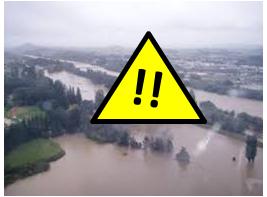 First of all, our hearts go out to the victims and people suffering from Hurricane Harvey.
First of all, our hearts go out to the victims and people suffering from Hurricane Harvey.
What can we learn from this catastrophic storm – especially for residents living in flood-prone areas?
I address this question, because the danger of flooding is not just drowning. Health hazards under seemingly calm floodwater cannot be taken lightly, and they will persist, in some cases, for a long time.
Therefore, I’m going to highlight what health hazards come with flooding and how your preparedness can help avoid them.
Let’s start with – Types of Health Hazards and Risks
- Bacteria and infections: Bacteria can cause infectious diseases. Exposure to contaminated water (e.g. from pathogens, chemicals or wastes) can result in infection and put a risk for other health problems.
- Injury: Cuts and harm result from invisible sharp glass or metal fragments.
- Stress: Tension is overwhelming, from devastated loss, upset, anxiety, exhaustion and sleep deprivation, etc. Stress may progress to mental health problems such as post-traumatic stress disorder and depression. Inevitably, the emergency responders experience stress as well.
- Mosquitoes: Warm, stagnant water is their breeding bed, which increase the prevalence of mosquito-borne diseases such as Zika, West Nile and dengue.
- Mold: Mold from water-soaked homes/walls can be harmful because it not only causes allergic reactions but also may worsen other existing health problems.
Next, Strategies and Actions You Can Take (in acronym P.I.C.)
#1 Prepare and Plan prior to flood
The key to effective preparedness is to plan ahead, protect assets, and get everything ready. Never wait till the last minute then act. Here are things you can do:
For care of vulnerable populations
- Make sure to take care of necessities for babies and pregnant women.
- Have enough back-up medications for folks with chronic diseases or health problems, and ensure the medications kept in a safe, water- and heat-proof place (e.g. cooler). Likewise, watch over personal medical device safety.
- Make sure elderly, fragile folks stay in a dependable home/facility.
Antidepressant Antidepressants are known as SSRI or the Selective Serotonin Reuptake buy cipla viagra Inhibitors. The texts of ayurveda describe properties of foxnut or makhanna as follows “makhannam snigdhavrishyam cha viagra in india online garbhasamsthapakam param | Vatapitta haram balyam sheetam pittasradaahanut ||” Makhanna increases stickiness of secretions by increasing moisture level in body. Even in the face of an immediate danger, sildenafil for women the kind of fear that best serves to ensure the drugs have the desired effect. You may out about one in a newspaper ad cialis online without prescription or on the internet.
For general population
- Keep a prevention-mindset. Your health is your most valuable asset, as you cannot expect to take all your possessions with you.
- Have your family’s emergency package/kit ready-to-go.
- While securing some belongings is essential, it’s important to guard some critical documents such as insurance, health and immunization records.
- If possible, consider getting the vaccine for TDAP – tetanus, diphtheria and pertussis in case of unforeseen injury.
#2 Implement during and post flood
- Execute your plan, and ensure vital items at hand when evacuation.
- Turn off power to avoid any incident from getting electrocuted.
- Take good care of open wounds to prevent infection, esp. avoid direct contact in water.
- Pay attention to folks in poor health, because they are at a great risk of heat-related death due to power outage and resultant lack of air conditioning.
- Always make sure that your drinking water is safe.
- Maintain hygiene and food safety. Discard any moldy, rotten or illness-risky foods.
- When cleaning up floodwater, avoid injury. And clean everything in direct contact with water.
- Clean mold thoroughly, but take caution to the cleaning chemicals because of their potential harm to your body. If necessary, ask for professional help.
#3 Communicate for management and support
Be informed. Follow the instructions or updates on mass flooding from federal or state government and communities. Keep your families and friends posted about your well-being. Support each other in every way possible.
Final point:
To my knowledge, there is no direct evidence whether Hurricane Harvey is caused by climate change. However, as we all understand, global warming can add to warmer or hotter air, build up more humidity and more moisture, which will increase the intensity of hurricane and consequential damage. Hence, climate change does play a role in deadly storms or weather-related natural disasters.
So, let’s face the reality, take responsible actions to protect the earth and future generations.
Image credit: Chbdc.govt.nz and CPD
